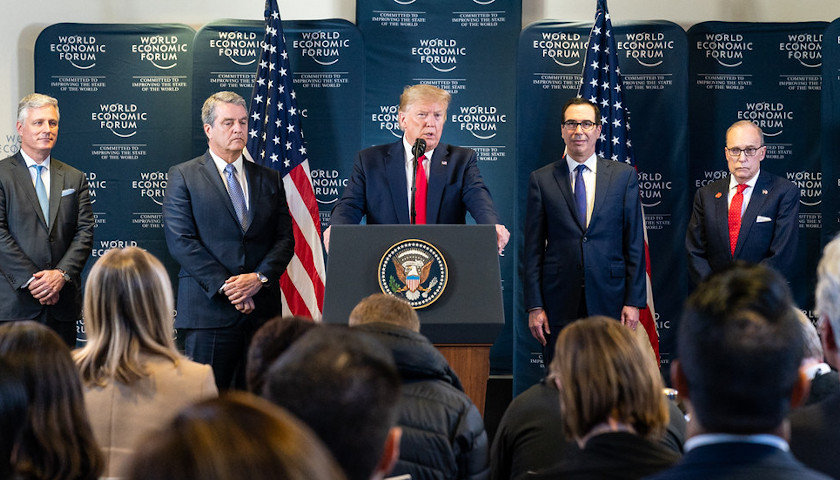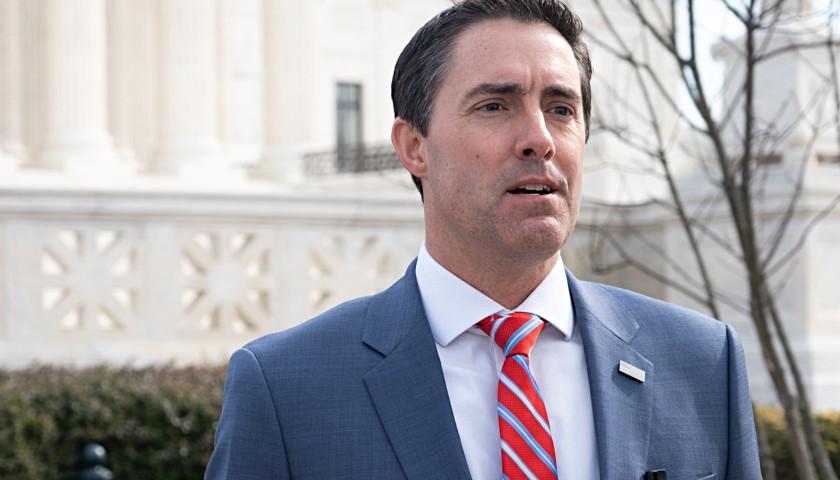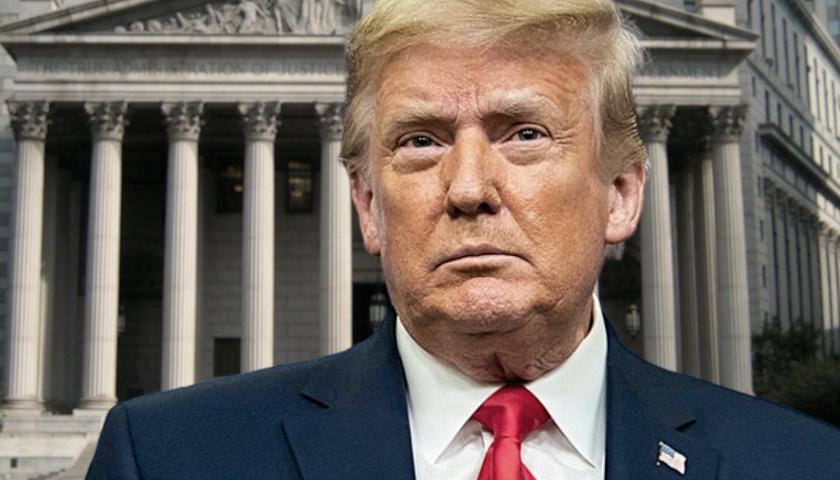by Conrad Black
The response to America’s killing of Iranian terrorist chief General Qassem Soleimani illustrates again how useless the Western alliance has become, and how correct this administration is to have defined U.S. national security interests and deployed forces adequate to maintain those interests itself.
The reaction of Europe to the Soleimani incident has been one of urgent and uniform official calls for “de-escalation.” British foreign secretary Domenic Raab at least managed the assertion that the U.K. was “on the same page” as the United States, confirming that the fundamental interests of the British and Americans remain closely aligned, as they have been for 80 years, since the elevation of Winston Churchill as prime minister in the midst of the greatest crisis in British history. The only noteworthy interruption of that alignment was the Suez episode in 1956, which was an outburst of insanity by Britain and France. Britain changed prime ministers (from Anthony Eden to Harold MacMillan) and Anglo-American relations swiftly returned to cordiality, where they have remained, cresting with the close cooperation between Ronald Reagan and Margaret Thatcher in the satisfactory conclusion of the Cold War.
But the rest of the Western alliance wrung its hands over Soleimani.
The French, who at least retain the mentality of a great power, possess a nuclear military capability and periodically intervene in their former colonies in Africa to reduce uncontrolled bloodletting, have called for “restraint.”
Germany possesses the economy and talent to be the third-most powerful country in the world, but lacks the will. Horrified still by the enormities it committed in plunging the world into two world wars and the unspeakable wickedness of Nazi genocide and military barbarity, it recoils from the role that beckons it. The Germans oscillate between the coziness of the Western alliance and the European Union, and unease with American leadership. After the death of Soleimani, German foreign minister Heiko Maas said he would speak to Iran, urged de-escalation, and said he would “redeploy” Germany’s 120 instructors in Iraq to keep them out of harm’s way. He also had the effrontery to urge the United States to accept the nonbinding vote of the scantily attended Iraqi parliament and withdraw from that country.
NATO secretary-general Jens Stoltenberg, who is normally fairly robust, also chirped away from the Euro-song sheet about de-escalation. It was abject relativism: two morally equivalent disputants. Apart from hints from the British, there was not an audible word from the many countries in NATO in outright support of the American action, though the Western alliance supposedly is held together by NATO’s Article 5, which states that an attack upon one is an attack upon all (though the subsequent article holds that each country will determine for itself how to respond to such an attack).
The eminent German commentator Josef Joffe, of Die Zeit, the Hoover Institution, and the American Interest, and one of Western Europe’s leading Americophiles, reprimanded Europe because it “wags its finger only softly.” There was the implicit view from the foreign ministries of Europe and from the alliance itself that the killing of Soleimani was an aggressive act, as if Iran had not been sponsoring terrorism all around the Western world and showering the United States and its allies with provocations, most recently inspiring the assault on the U.S. embassy in Baghdad which caused serious damage and which U.S. Marines had to repel with heavy inundations of tear gas.
The day following that outrage, Iran’s supreme leader, Ayatollah Ali Khamanei, advised his fellow worshipers that “There isn’t a damn thing [Trump] can do about it.” All the European governments knew that Soleimani was one of the world’s foremost terrorists, morally indistinguishable from Osama bin Laden and ISIS “caliph” Abu Bakr al-Baghdadi apart from the practically irrelevant fact that he wore an Iranian military uniform.
It was somewhat like the desperate complaints in 1986 at the U.S. airstrike on Libya after the Libyans had blown up a bar in West Berlin, killing a number of American soldiers. Margaret Thatcher had to suppress in her cabinet opposition to allowing use of American airbases in England for the mission by pointing out that an alliance based on the proposition that the United States could have the great honor of guaranteeing Western Europe’s security but couldn’t use its own airbases in Europe to respond to terrorist outrages would not have much life as an alliance. The Americans had to fly around France and Spain to get to their target in any case.
We are back to the same point, an “alliance of the willing,” as it became after the end of the Cold War.
Joffe is critical of Europe for its weakness, despite its considerable military forces (substantially increased under pressure from the Trump Administration) and its economic strength. He imputes to Europe’s leaders a pervasive irresolution and a paralyzing fear of Iran’s ability to incite terrorist incidents on the continent. But even Joffe proclaimed: “America, thy name is capriciousness,” and accused President Trump of unpredictable and arbitrary lurches of policy, and cites Trump’s passivity after the Iranian attack on Saudi oil installations in 2019.
In fact, Trump has been perfectly consistent: the United States will respond to attacks upon it, not attacks upon allies who can defend themselves, other than in cooperation with the offended parties. Saudi Arabia, in any case, is not the sort of regime that the United States can easily go to the mat for, other than to prevent the House of Saud from being replaced by something radically worse.
The Europeans fussed and fidgeted when Trump withdrew 400 Americans from an impossible position between the Turkish army and the uninhibited PKK Kurdish semi-terrorist militia, but declined to furnish any forces for such a challenging mission themselves. Even the relatively sensible Spectator in London denounced the Soleimani killing as unjust because Soleimani was trying to negotiate arrangements with Saudi Arabia, and a diplomatic disaster because of pan-Sunni hostility and the unifying impact of Soleimani’s killing on Iran. We saw how “unified” Iran was with the immense demonstrations against its corrupt theocracy after it admitted to having shot down a Ukrainian airliner three days later.
The Trump Administration is perfectly consistent: it confronts and contains countries that threaten it, as America did with Nazi Germany, upon which Franklin Roosevelt effectively waged war without declaring it, and as it did with the Soviet Union. America will remain in alliances where the other powers pull their weight, but will not be treated like a great St. Bernard which does the heavy work and takes the risks and pays the costs while useless allies try to hold the leash and give instructions. Europe is not under any threat from Russia, and France and Britain alone could deter Russia in nuclear terms. The Europeans are making only the feeblest gestures against the criminal regime in Tehran.
Europe has completely forgotten Bismarck’s aphorism that disputes between countries are ultimately settled by “blood and iron.” When Iran shouted of revenge after the death of Soleimani, Trump said any reprisal would be responded to “immediately and disproportionately.” This the Iranians understood. Their revenge was a fireworks display designed to avoid American casualties.
The United States needs to give Russia an incentive not to deliver itself like a new bride to China, and needs to exploit rivalries between Turkey and Iran, not unite them. It is happy to promote an understanding between Egypt and Saudi Arabia and Israel, now that the incursions of the ancient Arab enemies, Turkey and Persia, make those states natural allies, and the Palestinian red herring has been all but abandoned. It was never much more than a distraction of the Arab masses from the misgovernment they were receiving.
Europe can dream on. Presumably, it will awaken from its torpor eventually, and its relations with the United States need not be abrasive. The alliance should continue, but can’t be counted on for much unless Europe is threatened. Clearly, Trump and Boris Johnson get on well and their countries will effect a commercial rapprochement post-Brexit. This will be, as it has been these 80 years, a good thing for the world. Trump told Theresa May when they first met that “A strong and independent Britain is a blessing to the world,” but she didn’t listen.
The United States will pursue its interests and will reciprocate allied support, but not write a blank check for every country that asks for it.
– – –
Conrad Black has been one of Canada’s most prominent financiers for 40 years, and was one of the leading newspaper publishers in the world as owner of the British telegraph newspapers, the Fairfax newspapers in Australia, the Jerusalem Post, Chicago Sun-Times and scores of smaller newspapers in the U.S., and most of the daily newspapers in Canada. He is the author of authoritative biographies of Franklin D. Roosevelt and Richard Nixon, one-volume histories of the United States and Canada, and most recently of Donald J. Trump: A President Like No Other. He is a member of the British House of Lords as Lord Black of Crossharbour.









Don’t let America follow like Europe.
European “leadership” has been without a backbone for many years. Their liberal/socialist agendas have caused a great degradation of resolve.